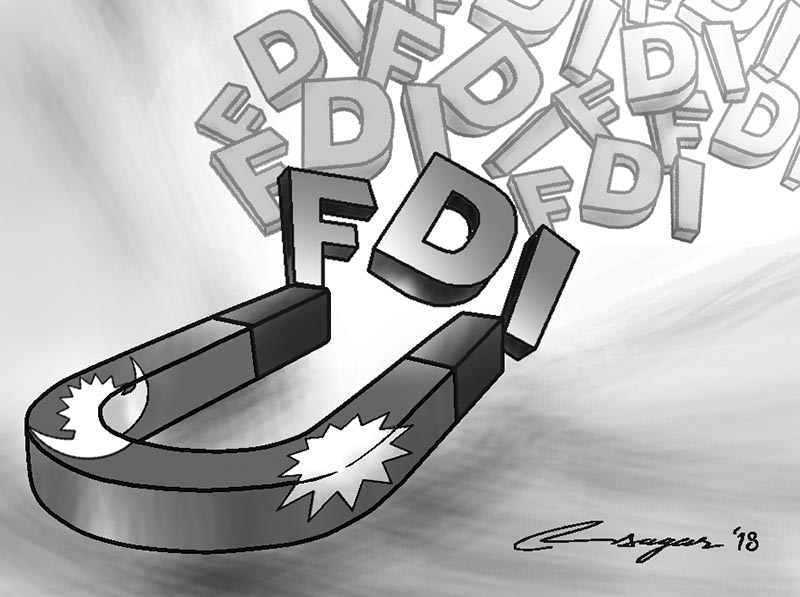Boosting FDI flows: Translate pledge into action
Despite efforts and promises, Nepal has not been able to bring in more foreign investors, and there are multiple factors for this. The government needs to identify the challenges and address them accordingly to attract more FDI
Acknowledging these positive aspects, developing countries nowadays aggressively seek to attract FDI, and to harness the dynamism of FDI projects for economic growth. This flow has several other positive effects including productivity gains, technology transfers, introduction of new processes to the local market, managerial skills and know-how, employee training and international production networks, among others. Excluding these economic advantages, FDI can also help in the improvement of environment and social condition in the host country by relocating “cleaner” technology and guiding to more socially responsible corporate policies. All of these benefits ultimately contribute to higher economic growth, which is the main instrument for alleviating poverty in those countries. Foreign Direct Investment (FDI) has a number of impacts on the economy of a host country influencing the production, employment, income, prices, exports, imports, balance of payments and general welfare. Flows of FDI are playing an instrumental role in building robust economic links not only between advanced and developing countries, but also among developing countries.
Before deciding on entering a new country, investors mull over a number of factors. One, a broad consensus in the host country in favour of FDI is crucial. In this context, a reasonably stable political environment, along with conditions that support physical and personal security, is an important benchmark that is employed in judging the possibility of adverse changes in the investment climate for foreign-owned firms. Two, corruption and governance concerns have a major bearing on investment prospects.
The investment regime and the environment for business — including the business licensing system, the tax regime and the attitude and quality of the bureaucracy — are vital. Third, a predictable legal system which, among other things, respects the sanctity of contracts and facilitates a level playing field is a must. Likewise, the countries that are best equipped to address infrastructure obstacles will procure larger amounts of FDI.
Based on the data of the Department of Industry, Nepal received FDI commitments equivalent to Rs.55.64 billion in 2017/18 as against Rs 15.21 billion in 2016/17. However as per data provided by the Nepal Rastra Bank, only FDI equivalent to Rs. 17.51 billion flowed into the country in 2017/18 compared to Rs. 13.50 billion in the preceding year. This implies that with respect to FDI data, there are often significant time lags between approval and actual investment. As a matter of fact, the actual investment may not happen at all.
Analogous to other developing countries, FDI is crucial to Nepal in promoting economic growth by providing capital, technology, and improvement of skills, efficiency and trade as well as by providing domestic small and medium-sized enterprises with linkages and markets for the supply of goods and services. Recognising these benefits, the Government of Nepal undertook a number of policy reforms focused on making Nepal a favourable and predictable investor destination. In this respect, a number of rules and regulations were introduced including the Foreign Investment and Technology Transfer Act of 1992 (with a new draft Foreign Investment Bill, currently under review), the Foreign Investment and One Window Policy of 2015, the Foreign Exchange Regulation Act of 1962, the Immigration Rules of 1994, the Customs Act of 1997, the Industrial Enterprise Act of 2016, and the Special Economic Zone Act, 2016.
However, despite these efforts, the country has not been able to tap its potential. Lack of roads, hydropower plants and customs infrastructures for cross-border trading have been impediments to the high FDI inflow in Nepal. Moreover, the slow pace of decision making has always been a major concern for foreign investors. They complain that the authorities make them wait for inordinate lengths of time, sometimes for no apparent reason. Even the World Bank’s Doing Business 2019 which analyses the ease of doing business in 190 countries reveals that Nepal has gone down five places to the 110th position in 2018. It was ranked 105th in 2017.
It should be recalled that an Investment Summit was organised in March 2017 to showcase Nepal’s investment opportunities, particularly to large scale investors. In that Summit, the government had signed letters of intent for investment to the tunes of $13.50 billion with foreign investors. However, it was not successful in capitalising on the commitments.
If the government intends to organise another Summit in the near future, the aim should be to mobilise investors to expedite development in critical areas such as infrastructure, energy and agriculture. It is also crucial for the government to make sure that all FDI-related laws and policies are endorsed with necessary amendments prior to the Summit.
While FDI is often superior in terms of capital and technology, spillovers to local economic development is not automatic. Appropriate policies to benefit from FDI include building up local human resource and technological capabilities to raise the absorptive capacity to capture productivity spillovers from multinational corporations.
Pant, a former executive director at Nepal Rastra Bank, writes on globalisation and trade






